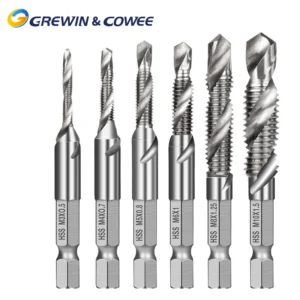目录
切换硬质合金钻头
When it comes to drilling copper, selecting the right tools is crucial for achieving high-quality outcomes. Overlaying precision and durability, 硬质合金钻头 for copper offer unique advantages that make them ideal for this purpose. However, with countless options available on the market, making a choice can feel overwhelming. This article aims to guide you through essential criteria and considerations for selecting the best carbide drills for copper.
Understanding the Nature of Copper
Copper is a versatile and highly conductive material widely used in electrical engineering, plumbing, and construction. Its softness and ductility make it an attractive choice for various applications. However, these same properties pose challenges during the drilling process. Ordinary drills may struggle with the material’s unique characteristics, leading to wear, breakage, or poor-quality holes. Here, carbide drills for copper shine brightly, offering both resilience and efficiency.
Benefits of Carbide Drills for Copper
耐用性和寿命
One significant benefit of carbide drills is their extraordinary durability. Unlike other drill types, carbides are extremely hard materials that can withstand higher temperatures and wear. For example, when tackling thick copper plates, a standard steel drill may dull quickly. In contrast, carbide drills can maintain their sharpness, allowing for smooth and consistent drilling over extended periods. Think about it: investing in a set of carbide drills for copper will save you time and money in the long run by reducing the need for replacements.
Precision and Cleanliness
Precision is paramount when drilling copper, especially for applications requiring electrical components. Carbide drills are designed with fine points that facilitate accurate drilling, minimizing the chances of bending or breaking through the material. For instance, when creating holes for wiring in a circuit board, a clean and precise hole prevents damaging adjacent areas, thus leading to more reliable electrical connections. Therefore, carbide drills for copper are experts in delivering both accuracy and cleanliness, critical factors in professional tasks.
耐热性
Copper generates heat during the drilling process, which could lead to thermal expansion and potential deformities in both the drill and the material being drilled. Here, carbide drills excel due to their heat-resistant properties. Unlike regular drills that may soften under high temperatures, carbide drills retain their hardness and shape, ensuring the drilling process remains stable and efficient. This characteristic is particularly beneficial for heavy-duty tasks, such as constructing copper pipelines.
Selecting the Right Carbide Drill
Now that we understand the benefits, let’s focus on how to select the best carbide drills for copper. When choosing, consider the following aspects:
1. Drill Bit Diameter
The diameter of your drill bit is a crucial factor in achieving the desired hole size. For standard wiring installations, a 1/8 inch bit may suffice. However, larger applications require wider bits; perhaps 3/8 or even 1/2 inch for heavier copper components. Always ensure you have a variety of sizes in your toolbox to meet different project needs.
2. Length and Type of Flute
The length of the drill bit and the type of flute (the grooves along the bit) play significant roles in drilling efficiency. For instance, shorter bits can provide added control for more delicate tasks, while longer bits help reach deeper areas. Furthermore, spiral flutes may be more effective in ejecting chips as you drill, keeping the workspace clean and minimizing the chance of overheating.
3. Coating
Some carbide drills come with special coatings that enhance their performance. For example, a titanium-coated carbide drill can offer improved corrosion resistance and a longer lifespan. When drilling copper, where durability is essential, considering a coated option can give you that extra edge in your projects.
4. Brand Reputation
The reliability of a tool often correlates with the brand’s reputation. Do some research or read reviews to understand which brands are trusted by professionals in the field. Experienced users often share insights that can save you from potential frustrations. Brands like Bosch, Makita, and DeWalt have established credibility in the market and are often recommended for their superior carbide drills for copper.
5. Price vs. Quality
While it might be tempting to go for the cheapest option, remember that quality tools contribute to better results and fewer headaches. A high-end carbide drill for copper may initially seem like a larger investment, but it often pays off in terms of durability, precision, and long-term savings due to reduced replacements.
Conclusion: Making an Informed Decision
Carbide drills for copper are invaluable tools that can elevate the quality of your projects, enhancing efficiency and precision. Their durability, heat resistance, and ability to create clean holes make them a must-have in any toolkit. When selecting the right carbide drill, consider factors such as drill bit diameter, flute type, coatings, brand reputation, and the balance between price and quality.
In a world where details matter, choosing the best carbide drills for copper becomes not just a decision, but an investment in the success of your projects. By applying the knowledge shared in this comprehensive guide, you can unlock new levels of performance and efficiency for all your copper drilling needs. Now armed with this information, are you ready to make a choice that will enhance your work quality and durability for years to come? Explore the options, weigh the advantages, and make your selections wisely, ensuring your endeavor becomes a resounding success.
